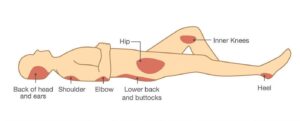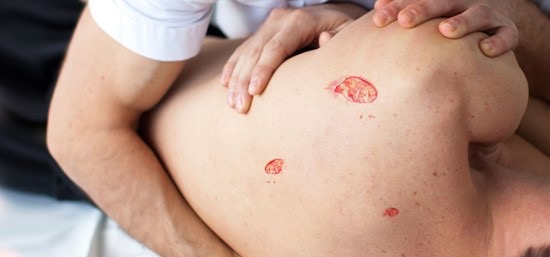Bedsores in the Elderly: Causes, Prevention, and Treatment
Bedsores, also known as pressure ulcers or decubitus ulcers, are a common issue among the elderly who suffer from limited mobility or prolonged bed rest. These sores occur as a result of continuous pressure on the skin and underlying tissues, leading to reduced blood flow and tissue damage.

Causes of Bedsores
1. Limited Mobility: Staying in the same position for extended periods causes continuous pressure on the skin.
2. Poor Nutrition: A lack of necessary proteins and vitamins for skin health can increase the risk of bedsores.
3. Chronic Diseases: Conditions like diabetes and heart disease that affect blood flow.
4. Weakened Immune System: The immune system weakens with age, increasing the risk of sores.
5. Moisture: Sweating or incontinence can irritate the skin and increase the likelihood of sores.
Stages of Bedsores
1. Stage One: Redness of the skin without tissue loss.
2. Stage Two: Superficial ulcers with partial skin loss.
3. Stage Three: Deep ulcers reaching the fat layer beneath the skin.
4. Stage Four: Very deep ulcers reaching muscles and bones.
Prevention
1. Regular Movement: Changing the patient’s position every two hours to reduce pressure on the skin.
2. Use of Specialized Mattresses and Cushions: Such as air mattresses that evenly distribute pressure.
3. Maintaining Skin Cleanliness: Regularly cleaning and drying the skin and applying moisturizers to keep it hydrated.
4. Good Nutrition: Eating a balanced diet rich in proteins and vitamins to promote skin health.
5. Regular Skin Monitoring: Regularly checking pressure-prone areas of the skin for early signs of sores.
Treatment
1. Wound Cleaning: Gently clean the sores using lukewarm water and mild soap.
2. Specialized Dressings: Use dressings that keep the wound moist and aid in healing.
3. Medications: Use antibiotics if the sores are infected.
4. Surgical Intervention: In severe cases, surgical intervention may be necessary to remove dead tissue and promote healing.
5. Nutritional Care: Ensure adequate nutrition rich in proteins and vitamins to promote the healing process.
Psychological and Social Support
1. Psychological Support: Provide psychological support to help the patient cope with pain and stress.
2. Social Support: Provide social support through family and friends to help the patient feel cared for and attended to.
Conclusion
Bedsores are a serious health issue that requires special attention and care, particularly among the elderly. By taking effective preventive measures and providing appropriate treatment, the risks of bedsores can be reduced, and the quality of life for patients can be improved.

